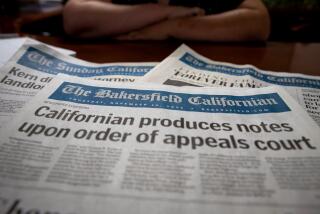High Court Won’t Hear Tabloid’s Appeal : Law: Privacy suit by comedian Eddie Murphy’s ex-girlfriend against National Enquirer will go before a jury. Case centers on 1st Amendment right.
- Share via
WASHINGTON — The Supreme Court cleared the way Monday for a jury in Los Angeles to decide whether the National Enquirer went too far when it reported on the amount of money that actor and comedian Eddie Murphy gave to support a girlfriend and their out-of-wedlock son.
The justices rejected without comment the claim that the press has an absolute 1st Amendment right to report the truth.
In March, a state appeals court in Los Angeles said that the Enquirer could be forced to pay damages to Tamara Hood, Murphy’s girlfriend, not because its story was inaccurate, but rather because it told too much about her private life.
For example, the judges cited financial details in a September, 1992, article, such as that Murphy had “set up a $1-million trust fund” for his son, Christian, and had bought “a $376,000 house” in Woodland Hills for the child and his mother.
The Enquirer maintained that its editors should decide what is newsworthy. But the state appeals court said that decision in a close case should be made by jurors.
“When reasonable minds could differ as to newsworthiness,” the state court said, “the issue is one for the trier of fact,” namely the jury.
“We recognize that the private lives of celebrities and those associated with them are matters of interest to large segments of the population. Therefore, they are generally newsworthy,” the state court said. However, “we cannot say as a matter of law that the details of a celebrity’s financial support of his child and Ms. Hood’s are newsworthy.”
The high court’s refusal to hear the appeal in the case (National Enquirer vs. Hood, 95-468), comes as no surprise. The justices rarely intervene before trial in a case involving damages.
But the lawsuit and the court rulings highlight a little-known, potentially unsettling, legal claim against the media.
Typically, members of the press are sued when they publish false information. Many press advocates think that the truth is the ultimate shield from such claims.
However, the laws in some states allow persons to sue the media for damages if their privacy has been invaded--even if the information published is true. And in these cases, the more specific and detailed the report, the greater the damages.
In suits involving claims of libel or defamation, the Supreme Court has shielded the press from paying damages when it reports on public figures. Only a reckless, false or malicious story is subject to a libel verdict.
In contrast, the high court has not ruled squarely on a free-press case involving a privacy claim and has not set standards that govern such cases.
Most news organizations, as a matter of policy and common sense, report on public figures and on matters of public concern. But the lines are not clear. Sometimes, private persons are thrust into the news because they are witnesses to a crime or an accident or are connected to prominent persons.
In California, the state courts have tried to balance the right of the press to report on matters of “legitimate public concern” with an individual’s right to shield “the intimate details of one’s private life.”
Private persons who are connected to “the famous or notorious . . . to some extent lose their right to privacy,” the state court said. But a news organization that is sued must convince a jury that “the social value of the facts disclosed” outweighs the individual’s loss of privacy, the state judges said.
“It’s disappointing,” Washington attorney John G. Kester, who represented the Enquirer, said of the Supreme Court’s refusal to review this judgment. “This is an issue they [the justices] will have to face sooner or later. California’s law on this is extreme. They throw it up to the jury to decide the ‘social value’ of a news story.”
But Santa Monica attorney Gary L. Bostwick countered that the press should not have the right to reveal personal details about Hood and her son, who “sought only to be left alone in the privacy of their lives.”
Early last year, Superior Court Judge Richard Kalustian threw out Hood’s suit because the facts in the Enquirer article “are newsworthy, are not private and are not offensive.”
But the appeals court revived the claim in March and now both the state Supreme Court and the U.S. Supreme Court have refused to squelch the suit.
More to Read
The biggest entertainment stories
Get our big stories about Hollywood, film, television, music, arts, culture and more right in your inbox as soon as they publish.
You may occasionally receive promotional content from the Los Angeles Times.











